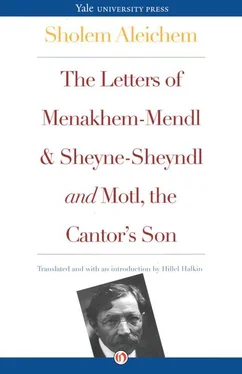I swear, you’ve never in your life seen a number like Big Meks! The greatest actor in the world is Tshahli Tsheplin and Meks does him down to the last detail. As soon as we left the theater he clapped on a little black mustache, turned out his feet, and started to waddle with his rear sticking out. You couldn’t have told him and Tshahli apart. Mendl — I mean Meik — went so wild that he gave Big Meks a kiss. Everyone outside the theater pointed and said, “There goes the second Tshahli Tsheplin.”
Even a grouch like Elye split his sides. Not for long, though. He stopped laughing pretty quick. How come? Because all of a sudden a voice said from a cellar:
“Joik!”
We all stared down into the cellar, trying to see who was there. Big Meks did too. Just then the voice called from overhead:
“Joik!”
Elye straightened up and stared at the rooftops. We all did. So did Big Meks. I tell you, it beat all! Only Meik and I knew where the voice was coming from. When we couldn’t hold it in any longer, we burst out laughing.
Elye was sore as hell. If we hadn’t been in the strit, he would have boxed our ears but good. But being smack in the middle of New York, he made do with a few juicy curses. When he had bawled Meik and me out, he pointed to Big Meks and said:
“Why don’t you learn from your friend? He’s your age and look how he behaves himself.”
“Joik!” said a voice behind Elye.
Elye spun around. So did Pinye and the others. Big Meks looked startled. Meik and I stood there howling.
“In America,” Pinye said, “even the sidewalks talk. I’d like to know who they’re calling joik.”
“Look in the mirror,” Elye said.
Was he surprised when a muffled voice said from below the ground:
“You’re dead wrong, Misteh Elye! The joik is you!”
That was Elye’s last visit to the moofink pikshehz. He doesn’t even want to hear about Tshahli Tsheplin any more.
In America no one stands still. You have to get ahead and grow bigger and better. Since we didn’t do enough biznis at our stend for seven people, we decided to move on to a staw. I’ve told you that in America you only have to look in the peypehz. There’s nothing you won’t find there.
A going staw isn’t cheap. You pay more for the name than for the merchandise. Even our stend, which barely cleared ten dahlehz a week, was worth money because of its name. We sold it to a grinhawn. He didn’t bother to check how much we made from it. It was enough for him to see seven people busy making a living. He was sure we had a good biznis.
We sold our stend with all its trimmings, the sawdeh fuhntin and the shawkays included. The one thing we kept for ourselves was Elye’s recipes for sirips and seideh. All the money in the world couldn’t get him to part with them. Let everyone make his own product, he said.
Take Elye’s Passover wine. It already has a reputation, even though this is only his first try. All our friends and acquaintances in the Kasrilevke shul have told us they’ll drink it next Passover. Pinye has edvehteized it all over New York. He’s let everyone know that even the prehzident intends to serve it at his Seder in the Veit Howss.
Pinye is a fiend at edvehteizink. He says it’s what America is all about. Every manufacturer edvehteizes his product. Every working-man edvehteizes his work. The whole world may know I make a drink that tastes like vinegar, but if I say it’s sweet as sugar it will sell. You don’t think what I do is worth a dahleh? I say it’s worth a million — and now pay up! That’s America. It’s a free country.
Having run an edvehteizink kempeyn for Elye’s Passover wine all over the Loaweh Ist Seid, Pinye went to my brother and said:
“Look here, Elye. I’ve edvehteized your wine as the world’s best. Don’t let me down. Let’s not have a wine like that drink you made in Russia. In America wine is wine, not barley beer!”
Elye was too offended to answer. He didn’t have to because Brokheh did it for him. Did she let Pinye have it!
“You’d think America was a country of snobs and ‘ristocrats who did nothing but drink wine and bathe in honey! Believe me, I wish I had a pehni for every quart of bread, kvass, and pickle brine that’s drunk in this country every day! Why, I’ve seen with my own eyes an awreitnitshke on Grend Strit asking for a bucket of kvass and ten dozen sour apples. Believe me, they’re better than all your ahrehndzhiz and grepfruhts that no one knows how to slice or eat …”
I’m only giving you the gist of what she said, because she’s hard to stop once she gets going. Pinye knows that as well as I do. He put on his hat and walked off. That’s the only way to deal with Brokheh. I do the same.
Kendee — Seegah — Steshenree Staw
with Five Rumz. Gud Biznis,
Best Neighborhood.
A Bahgn! Singilmehn, Quick Sale.
That’s what it said in the noospeypeh. When you’re single and have no family to support, you don’t haggle over the price. It looked like the biznis for us. In fact, it seemed tailor-made. We went to have a look.
The men went first. That’s Pinye, Elye, Maik, and myself. Since we liked what we saw, the women went too — that’s Brokheh, Taybl, and my mother. They didn’t like what they saw at all. Each found something wrong with it. My mother thought it was too far from her synagogue. Of course there was a synagogue next door, but it wasn’t the Kasrilevke shul.
“I suppose,” Elye said, “that the Kasrilevke shul prays to a different God.”
“It’s the same God,” said my mother. “It’s just not the same Jews.”
She’s used to the Jews from Kasrilevke. She says they have their own way of praying. She can’t imagine listening to any cantor but Hirsh-Ber.
That was my mother’s objection. Brokheh had one of her own. What were we going to do with so many rumz? Who needed five of them?
Our neighbor Pesye had a suggestion. Why didn’t we rent the rumz out? In America that’s called taking in bawdehz. A bawdeh pays to live in your house and eat his meals with you.
“That’s all we need!” Brokheh said. “A bunch of bawdehz at our table!”
“That’s all we need!” Taybl repeated. “A bunch of bawdehz!”
“Maybe for once,” Pinye said to her, “you’ll say something original instead of parroting whatever Brokheh says!”
“It’s easy to criticize!” said Brokheh, turning on Pinye.
“It’s easy to criticize!” Taybl agreed.
“What will you do if Brokheh ever leaves you?” Pinye asked.
“What she does is her own business,” Brokheh said.
Taybl said, “What I do is my own business.”
“Foo!” Pinye spat and walked off.
Don’t think we were the only ones to have a look at that biznis. Our in-laws, friends, and acquaintances went too. The first to go was Yoyneh the bagel maker. After him went Riveleh. They went separately so as not to leave their knishes.
Moyshe the bookbinder was next, followed by Fat Pesye …baht ekskyooz mee, eiv meyd ah misteyk. Fat Pesye went before Moyshe. He was followed by some friends from the Kasrilevke shul who know a thing or two about biznis.
The singilmehn wasn’t nice to them. In fact, he drove them all away. He had never seen such a large family in his life, he said. My mother was so upset that she went back with Brokheh to talk to him. Brokheh gave him an earful. That made the singilmehn swear to God he’d changed his mind. He had wanted to sell his biznis, he said, in order to get married, but if a woman could have a mouth like Brokheh’s, marriage was not a good idea. Better to stay a singilmehn and keep the biznis.
That’s just talk. The singilmehn wants to sell his biznis as badly as we want to buy it. We’ve almost sold our stend. I say almost because the grinhawn has already given us an advance. That’s called a dehpahzit. We’re beginning to feel sorry we took it because he hangs around our stend all day long. You can see he doesn’t want to leave it.
Читать дальше












